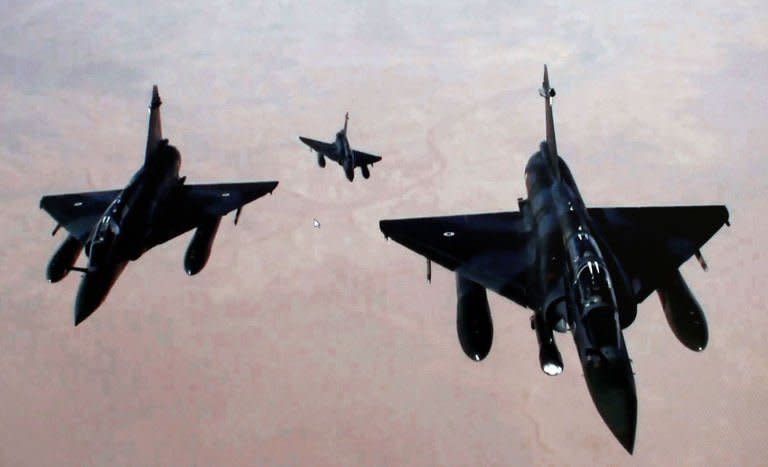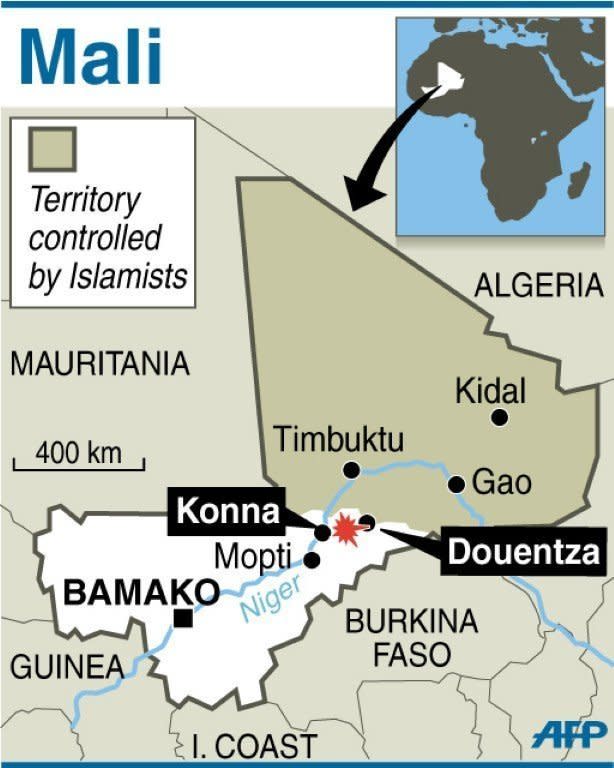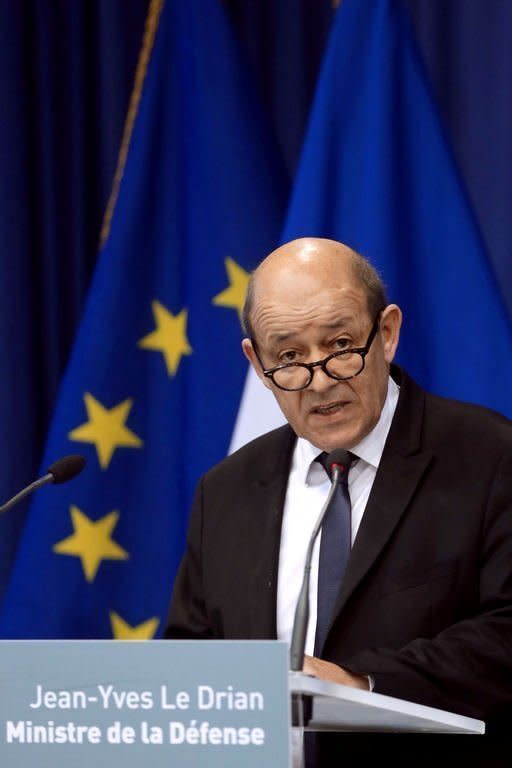French air power stops Mali Islamist advance
Mali's army took back a key town from Islamist rebels Saturday aided by French air power, opening a dramatic new phase in the conflict that France's leader declared is a battle against terrorism. International momentum to wrest northern Mali back from the control of Al-Qaeda-linked groups built after the French air raids helped reclaim the front-line town of Konna, with Burkina Faso, Niger and Senegal each pledging 500 troops to an African force tasked with regaining the north. France's President Francois Hollande declared "Operation Serval" a success, saying French air power -- deployed on Friday to stop the rebel onslaught -- had "served to halt our adversaries," and that the intervention had "only one goal which is the fight against terrorism." "Our foes have suffered heavy losses," he said. The battle left dozens of dead rebels strewn across the area, according to witnesses and the Malian military. France's forces suffered one casualty, a pilot killed carrying out air raids, said French Defence Minister Jean-Yves Le Drian. Hollande, who has struggled on the domestic front and seen his popularity hit record lows, said French forces would remain involved as long as necessary. He sent the UN Security Council a letter asking to speed up plans to send a 3,300-strong African force into Mali. Hollande also said that following the intervention he had ordered tightened security at home, saying France "has to take all necessary precautions" in the face of a terrorist threat. The collapse of a nation formerly seen as a democratic success story in the region has sparked fears that northern Mali could become a launchpad for global terrorist attacks. The Malian army said it was in full control of Konna after spending much of Saturday flushing out the last pockets of resistance following the battle, one of the worst clashes since the start of the crisis and the most significant setback inflicted on the Islamists. Insurgents seized the town -- which is some 700 kilometres (400 miles) northeast of Bamako -- on Thursday, threatening to advance on the capital. US officials said Washington might support France's sudden military intervention. British Prime Minister David Cameron said he welcomed the "military assistance France has provided to the Malian Government, at their request", and European Commission President Jose Manuel Barroso praised the "courageous action by French troops". But Russia's Africa envoy, Mikhail Margelov, lashed out at the French move. "African residents aside, no one else can or should solve the continent's problems," Margelov said. Around 60 Islamists including women in veils protested outside the French embassy in London against the intervention, holding placards that read "French army, you will pay" and "Sharia is the only solution for Mali". Malian residents however thanked France for its support. "The French really saved us," said thirty-something Moussa Toure in Bamako -- a remark echoed by others, including Mali's interim president, Dioncounda Traore. France also said it had deployed troops in the capital to protect the former colonial ruler's 6,000-strong expatriate community. The capital has remained under government control throughout the crisis, which erupted in the wake of a March 22 coup that ousted democratically elected president Amadou Toumani Toure, creating a power vacuum that allowed the Islamists to seize the vast desert north. Since seizing the territory, about the size of France, the Islamists have destroyed centuries-old Muslim mausoleums they see as heretical and imposed an extreme form of Islamic law in the main towns, flogging, amputating and sometimes executing accused transgressors. Mali's armed forces had been in disarray since the coup and seemed powerless against a rebellion of seasoned fighters, but France's shock intervention tipped the power balance. "The helicopters struck the insurgents' vehicles, which dispersed," a Malian military source said. In the wake of the battle, West African nations sped up preparations to send troops to join the fight against the Islamists. Ivory Coast's African Integration Minister Ally Coulibaly said the mission was being rapidly pushed forward and that the first troops could arrive as early as Sunday. An unclear number of West African military personnel were already on the ground in Mali. The UN Security Council has approved a 3,300-strong African force to help Mali defeat the rebels, but it had not been expected to deploy before September. Mali's interim administration however warned it could not afford to wait months for a game-changer. With the situation evolving rapidly, the 15-nation Economic Community of West African States (ECOWAS) announced late Friday it had authorised the immediate deployment of troops. Tunisian President Moncef Marzouki meanwhile said his country was becoming a corridor to deliver arms once used to fight former Libyan strongman Moamer Kadhafi's regime to Islamists in Mali. "The situation in Mali has always worried us because we have begun to understand that our 'jihadists', quote unquote, have ties with these terrorist forces," Marzouki said. His comments came as the premiers of Algeria, Libya and Tunisia sealed a pact to secure their borders against arms trafficking.






